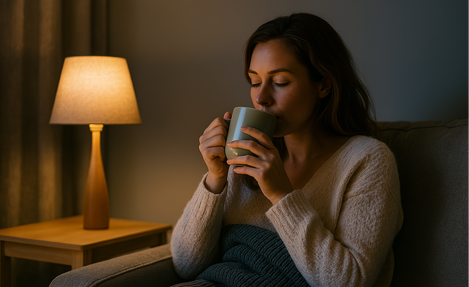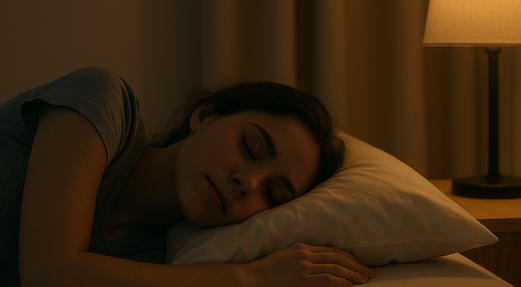The Sleep Struggle Is Real
If you’ve ever tossed and turned at night, staring at the ceiling, you’re not alone. Studies suggest that 10% to 30% of adults experience insomnia at any given time, with even higher rates among older adults and those with disrupted sleep schedules (Bhaskar et al., 2016; Ohayon, 2002). Poor sleep doesn’t just make you feel tired—it’s linked to higher risks of heart disease, obesity, and mental health issues (Sateia, 2014).
In the search for better sleep, two supplements often come up: melatonin and magnesium. But which one actually works?
Both have science-backed benefits, but they function differently. Melatonin helps regulate sleep timing, while magnesium supports relaxation and sleep quality. Some people swear by one, others use both—but which is the best choice for you? Let’s break it down.
Melatonin for Sleep
How Melatonin Works
Melatonin is a hormone that tells your body when it’s time to sleep. Your brain produces it naturally in response to darkness, but screen time, artificial lighting, shift work, and aging can throw off melatonin levels, making it harder to fall asleep (Duffy et al., 2022).
Taking a melatonin supplement can help reset your sleep cycle and improve sleep quality. Studies show it reduces the time it takes to fall asleep and increases total sleep duration, especially for older adults and people with sleep disorders (Sun et al., 2023; Duffy et al., 2022). A 5mg dose has been found to significantly boost sleep efficiency in older adults, even improving sleep during the day (Duffy et al., 2022).
Who Benefits Most from Melatonin?
Research suggests melatonin is most helpful for:
✔ People who struggle to fall asleep – It can shorten sleep onset time (Chan et al., 2021).
✔ Older adults – Since melatonin production declines with age, supplementation can improve sleep efficiency (Duffy et al., 2022).
✔ Shift workers & travelers – It’s effective for resetting disrupted sleep schedules and reducing jet lag (Sun et al., 2023).
✔ People with PCOS – Studies suggest it improves sleep and metabolic health in women with polycystic ovary syndrome (Alizadeh et al., 2021).
Are There Any Downsides?
Melatonin is generally safe, but not everyone responds the same way. Some studies suggest that using it long-term might reduce its effectiveness, as the body may adjust to it over time (Chan et al., 2021). Side effects can include grogginess, vivid dreams, and headaches, but they’re usually mild.
Magnesium for Sleep
How Magnesium Works
Magnesium is an essential mineral that helps relax the nervous system and prepare the body for sleep. It activates GABA receptors, which help calm the brain and reduce stress before bedtime (Abbasi et al., 2012). Magnesium also acts as a natural NMDA antagonist, preventing overstimulation that can keep you awake (Dasdelen et al., 2022).
Does Magnesium Actually Improve Sleep?
Yes! Research shows magnesium can:
✔ Increase total sleep time – One study found it helped people sleep longer and improved sleep efficiency (Abbasi et al., 2012).
✔ Reduce the time it takes to fall asleep – Supplementation has been linked to faster sleep onset in people with insomnia (Abbasi et al., 2012).
✔ Improve sleep quality – Another study found it helps people wake up less during the night and feel more rested in the morning (Liaqat et al., 2023).
Since magnesium relaxes muscles and lowers cortisol (the stress hormone), it may also be beneficial for people who experience stress-related sleep problems (Abbasi et al., 2012).
Who Benefits Most from Magnesium?
Magnesium is particularly helpful for:
✔ Older adults – Studies show it improves sleep efficiency and morning alertness (Abbasi et al., 2012).
✔ People with insomnia – Research confirms it helps reduce sleep disturbances and nighttime awakenings (Liaqat et al., 2023).
✔ Anyone struggling with stress-related sleep issues – Magnesium supports relaxation by calming the nervous system (Dasdelen et al., 2022).
Are There Any Downsides?
Magnesium is generally safe, but taking too much can cause digestive issues like diarrhea (Abbasi et al., 2012). Different forms of magnesium absorb at different rates—for sleep, magnesium glycinate and taurate are often recommended, as they’re well-absorbed and gentle on the stomach.
| Struggle With… | Best Choice | Why |
|---|---|---|
| I can’t fall asleep easily. | Melatonin | It helps reset your sleep cycle and shortens the time it takes to fall asleep (Sun et al., 2023). |
| I wake up a lot during the night. | Magnesium | It relaxes the nervous system and promotes deeper, uninterrupted sleep (Abbasi et al., 2012). |
| My sleep schedule is off (jet lag, shift work). | Melatonin | It regulates your internal clock, making it easier to adjust to new sleep patterns (Duffy et al., 2022). |
| Stress or anxiety keeps me awake. | Magnesium | It calms the body by supporting GABA, a neurotransmitter that reduces stress (Dasdelen et al., 2022). |
| I want a long-term sleep solution. | Magnesium | Melatonin is best used short-term, while magnesium supports sleep quality over time (Chan et al., 2021). |
| I need the strongest sleep support possible. | Both | Research shows that combining them leads to better sleep efficiency and fewer disturbances (Alizadeh et al., 2021). |
| I wake up feeling groggy, even after a full night’s sleep. | Magnesium | Poor sleep quality can cause morning grogginess, and magnesium helps improve deep sleep cycles (Liaqat et al., 2023). |
| I work night shifts and need to sleep during the day. | Melatonin | It signals to the body that it's nighttime, making daytime sleep easier (Sun et al., 2023). |
| My muscles feel tense, restless, or cramp up at night. | Magnesium | It helps with muscle relaxation and reduces cramping, making sleep more comfortable (Abbasi et al., 2012). |
| I wake up too early and can’t fall back asleep. | Magnesium | It promotes longer, more sustained sleep and reduces early morning awakenings (Abbasi et al., 2012). |
| I have frequent nightmares or vivid dreams. | Melatonin | Some studies suggest melatonin can help regulate dream cycles and reduce nightmare frequency (Sun et al., 2023). |
| I wake up with headaches or migraines. | Magnesium | Magnesium plays a role in reducing migraine frequency and can help prevent headaches caused by poor sleep (Abbasi et al., 2012). |


Final Verdict: Which One Should You Choose?
✅ If your main problem is falling asleep, melatonin might be the best option.
✅ If you want better overall sleep quality and relaxation, magnesium could be the better choice.
✅ If you struggle with both, combining them may offer even greater benefits.
Conclusion
Both melatonin and magnesium have solid research behind them, but the best choice depends on your personal sleep struggles. Have you tried either of these? What worked best for you? Drop a comment below!
References
Abbasi, B., Kimiagar, M., Sadeghniiat, K., Shirazi, M., Hedayati, M., & Rashidkhani, B. (2012). The effect of magnesium supplementation on primary insomnia in elderly: A double-blind placebo-controlled clinical trial. Journal of Research in Medical Sciences : The Official Journal of Isfahan University of Medical Sciences, 17, 1161 - 1169.
Alizadeh, M., Karandish, M., Jafarabadi, M., Heidari, L., Nikbakht, R., Rezaei, H., & Mousavi, R. (2021). Metabolic and hormonal effects of melatonin and/or magnesium supplementation in women with polycystic ovary syndrome: a randomized, double-blind, placebo-controlled trial. Nutrition & Metabolism, 18. https://doi.org/10.1186/s12986-021-00586-9.
Bhaskar, S., Hemavathy, D., & Prasad, S. (2016). Prevalence of chronic insomnia in adult patients and its correlation with medical comorbidities. Journal of Family Medicine and Primary Care, 5(4), 780–784. https://doi.org/10.4103/2249-4863.201153
Chan, V., & Lo, K. (2021). Efficacy of dietary supplements on improving sleep quality: a systematic review and meta-analysis. Postgraduate Medical Journal, 98, 285 - 293. https://doi.org/10.1136/postgradmedj-2020-139319.
Dasdelen, M., Er, S., Kaplan, B., Celik, S., Beker, M., Orhan, C., Tuzcu, M., Şahin, N., Mamedova, H., Sylla, S., Komorowski, J., Ojalvo, S., Şahin, K., & Kılıç, E. (2022). A Novel Theanine Complex, Mg-L-Theanine Improves Sleep Quality via Regulating Brain Electrochemical Activity. Frontiers in Nutrition, 9. https://doi.org/10.3389/fnut.2022.874254.
Duffy, J., Wang, W., Ronda, J., & Czeisler, C. (2022). High dose melatonin increases sleep duration during nighttime and daytime sleep episodes in older adults. Journal of Pineal Research, 73. https://doi.org/10.1111/jpi.12801.
Liaqat, A., Rizwan, B., Amjad, A., & Rasool, Z. (2023). Therapeutic Effect of Magnesium Supplementation in Improving Quality of Life among Elderly Insomniac Participants. Pakistan Journal of Health Sciences. https://doi.org/10.54393/pjhs.v4i09.995.
Ohayon, M. M. (2002). Epidemiology of insomnia: what we know and what we still need to learn. Sleep Medicine Reviews, 6(2), 97–111. https://doi.org/10.1053/smrv.2002.0186
Sateia, M. J. (2014). International classification of sleep disorders-third edition: highlights and modifications. Chest, 146(5), 1387–1394. https://doi.org/10.1378/chest.14-0970
Sun, Y., Chen, J., Shi, X., Li, Z., Wan, L., Yan, H., Chen, Y., Wang, J., Wang, J., Zou, L., Reiter, R., Zhang, B., & Yang, G. (2023). Safety and efficacy of melatonin supplementation as an add‐on treatment for infantile epileptic spasms syndrome: A randomized, placebo‐controlled, double‐blind trial. Journal of Pineal Research, 76. https://doi.org/10.1111/jpi.12922.



Add comment
Comments